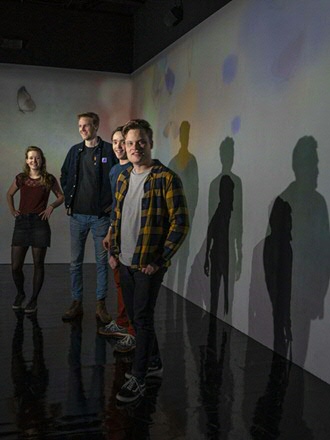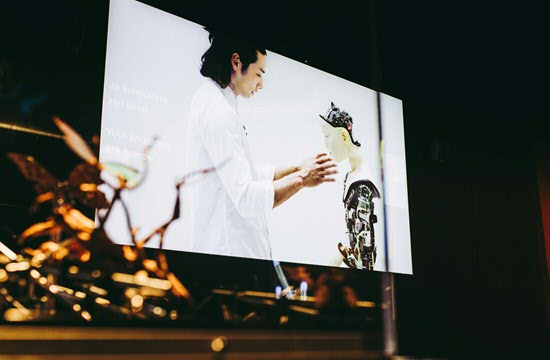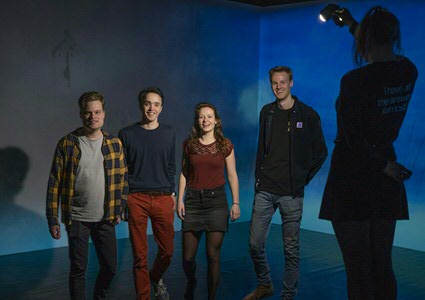Students explain Artificial Intelligence in the new Forum Groningen

Artificial Intelligence students Martijn, Eline, Pim and Bram are giving guided tours, courses and demonstrations at the AI: More than human exhibition in the new Forum Groningen. An informative experience, with cuddly robots, dancing children and wary adults.
What does the programme in Artificial Intelligence involve?
‘Our degree programme in Artificial Intelligence (AI) is about understanding the current level of intelligence in humans and animals. We then use this as a source of inspiration for designing computer systems that make use of this intelligence. A system is only an AI system if it uses human intelligence to make decisions or perform tasks.’
Are you enjoying the programme?
‘We all think it’s an incredibly interesting programme! The best thing about it is the fact that the field of AI is so broad. You need knowledge from a range of disciplines in order to create smart systems like these. Knowledge of computer sciences, logic and mathematics is needed for the programming aspect. Then you need cognitive psychology, neurobiology and linguistics to understand the workings of the brain and our intelligence. And of course we’re also taught about the ethical aspects of AI. You have course units in all these subjects during the Bachelor’s phase, so that you can work out which particular aspect of AI you’re most interested in before deciding which Master’s degree to take.’

You’re giving guided tours, courses and demonstrations at the AI: More than human exhibition. How does this work?
‘One of the basic principles of the Forum is, “It's better to anticipate the future than to be taken off guard.” To show people the possibilities of the future, there’s a large-scale programme called “Human & Machine”. We are there to make people enthusiastic about the endless opportunities offered by AI, but also to inform them about the possible threats and the ethical dilemmas that may arise. We’ve designed a side programme that we think will appeal to various target groups. The demonstrations are primarily aimed at children, while the courses focus on the ethical and technical aspects of AI.’
How does this supplement the knowledge you acquire during your degree programme?
‘It's really interesting to meet so many different people and tell them about AI. Everyone you talk to has different views on the subject, or different connections with it. People from the healthcare sector sometimes tell us about how they are trying to use robots to help patients with dementia. We learn a lot from practical examples like this. We are also learning how to make a tricky subject like AI comprehensible to people from very different backgrounds, which will become increasingly important as AI is more firmly embedded in other disciplines. However, we are also developing our didactic skills, something that doesn’t really feature in the degree programme.’

What do the public think about the exhibition and the AI applications on show?
‘You can tell that everyone has either read or heard about AI, but that nobody really knows how it works or what we can do with it. This might be why the subject tends to make people anxious. We’re trying to alleviate their fears and provide more clarity. At the same time, we want to inspire people to keep exploring the subject. Children aren’t the least bit afraid. They will have a go at anything, they want to touch everything and only seem to be excited by the possibilities. We have two NAO robots on loan from the UG. These are humanoid robots, about 50 cm tall. Adults are wary of them, but you can't keep the children away. We recently saw a little girl, about the same size as the robot, who spent half an hour dancing, cuddling and chatting with it. With a bit of luck, we’re helping to inspire a new generation of AI students and researchers.’
Do people’s reactions make you reflect on your field?
‘During the exhibition, we try to kindle the discussion about the ethical aspects of our story. We’ve noticed that the impact of all these developments is causing people a lot of concern and even making them a little anxious. This is particularly true when it comes to privacy issues. It makes us think about how we deal with these topics in the programme, but also in the business world, where everyone spends months or years developing and improving new products and services. The time spent considering the implications and ethical aspects of these developments is negligible in comparison.’
And what do you think of the new Forum?
‘We’ve noticed that people need time to get used to such a huge, modern building in the middle of our old city centre. Luckily, so many great activities, workshops and talks are organized that everyone soon feels involved. So we think that the social function of the Forum is exceeding expectations!’
- Pim Praat is a student of the Bachelor’s degree programme in Artificial Intelligence. After graduating, he hopes to spend a few years doing research in an AI lab before finding an interesting business application field.
- Eline Meijer is a student of the Master’s degree programme in Human Machine Communication. She plans to work in the healthcare sector to study the potential applications of AI in healthcare.
- Martijn Luinstra is a student of the Master’s degree programme in Computing Science. He is not yet entirely sure what he wants to do when he graduates.
- Bram Rijsbosch is a student of the Bachelor’s degree programme in Artificial Intelligence. He wants to work for the government or in politics, so that he can work on major social issues relating to AI, both now and in the future.
Contact
Bram Rijsbosch, b.u.rijsbosch[at]student.rug.nl
| Last modified: | 19 March 2020 4.35 p.m. |
More news
-
29 April 2024
Tactile sensors
Every two weeks, UG Makers puts the spotlight on a researcher who has created something tangible, ranging from homemade measuring equipment for academic research to small or larger products that can change our daily lives. That is how UG...
-
29 April 2024
Behind the scenes: how UG and Hanze UAS students are jointly developing a Mars rover
This year the students of the Makercie team are participating in the physical edition of the European Rover Challenge in Poland. Read more about the team and the collaboration between the RUG and Hanze UAS here.
-
23 April 2024
Nine MSCA Doctoral Network grants for FSE researchers
Nine researchers of the Faculty of Science and Engineering have received a Horizon Europe Marie Sklodowska Curie Doctoral Network grant.
